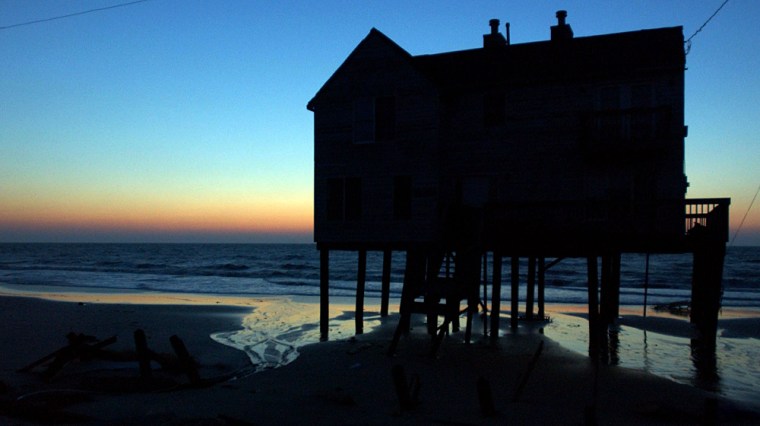Owning a vacation home is no longer an impossible dream, but there are basic steps that must be taken to prevent the dream from becoming a financial nightmare.
Pencil out the finances before you close the deal, because if buying your vacation home is a stretch, it will kill the fun of your getaway. And don't count on rental income to cover the entire cost of your vacation home.
“Before you invest in a second home, consider the location, pricing trends and the time horizon for your gain,” says Edward Powell, chief consumer officer of Charlotte, N.C.-based LendingTree.com “A lot of people take equity out of their current home to make a down payment on a second house. That's fine if the market continues to rise, but if it flattens or falls, you can get into big trouble in a hurry.”
Many lenders require buyers to put down at least 20 percent on a second home, and some require 25 percent or more. Renting out a vacation home is a good way to cover some of the cost, but lenders often factor in a 25 percent vacancy rate when determining your qualification for the loan.
The lesson is clear: Don't be overly optimistic on rental income — and you're nuts if you think the vacation home will pay for itself immediately and in perpetuity. A vacation home can be just about self-sustaining, but it takes careful planning and hard work. You shouldn't buy a second home on the assumption that it will pay for itself.
If you plan to rent your vacation home, peg the rent 10 percent to 20 percent higher than your monthly mortgage payment in order to cover costs. For starters, you'll have to hire someone to maintain the property in your absence, and unexpected repairs are a given.
Keep in mind that renting your property immediately puts you in conflict with the calendar: The most lucrative times to rent are the same times when you and your family will want to enjoy the getaway — summer and Christmas.
You'll also have to decide what type of property you want: a house or a condo. The beauty of a condo is that routine maintenance is included in the association fees, so you won't have to hire anyone to cut the grass or make routine repairs.
EscapeHomes.com of San Francisco listed the top ten second-home markets in February 2005 as:
- Myrtle Beach, S.C.
- South Padre Island, Tex.
- Naples, Fla.
- Holden Beach, N.C.
- Ocean City, N.J.
- Las Vegas, Nev.
- San Diego, Calif.
- Park City, Utah
- Orlando, Fla.
- Santa Fe, N.M.
When researching an area, balance current price with expected appreciation, and ask a basic question: Are you buying at or near the top? If you're priced out of a hot market, take a look at up-and-coming areas
EscapeHomes.com says the top ten developing markets for second homes are:
- Big Lake, Alaska
- Brunswick, Me.
- Clear Lake, Calif.
- Livingston, Mont.
- Linden, Nev.
- Murphy, N.C.
- Paonia, Colo.
- Talent, Ore.
- Vashon Island, Wash.
- Venice, Fla.
Insane market
Baby Boomers are now nearing retirement age and are driving the market for second homes insane. A review of 2003 census data by the National Association of Realtors (NAR) found 43.8 million second homes, including 37.2 million investment homes and 6.6 million vacation homes. There are about 72.1 million owner-occupied homes in the U.S.
“Because the typical second-home buyer is a baby boomer, it's likely over the next decade that second-home sales will remain historically high,” says David Lereah, chief economist for the Chicago-based trade association.
The NAR says 23 percent of all homes purchased in 2004 were for investment purposes, and another 13 percent were vacation homes.
Second home sales totaled 2.82 million last year, up from 2.42 million, or about 16 percent, in 2003. Sales of investment homes totaled 1.8 million, up about 14 percent from 1.57 million in 2003. And the sales of vacation homes rose to 1.02 million, up almost 20 percent from the 850,000 sold in 2003.
There are many financial Web sites that can outline the basics of financing a second home, including LendingTree.com, a division of IAC Interactive, JPMorgan Chase, Bank of America, Citigroup and Wells Fargo.
When taking notes and researching your vacation home, write the word "CAUTION" in bold letters at the top of the page.
“If property-appreciation rates decline, those investors who need to sell their properties may not be able to get the prices they're counting on, which may lead to an increase in defaults,” says Beth Haiken a spokeswoman for PMI Mortgage Insurance in Walnut Creek, Calif.
This happened in the 1980s, which forced the mortgage insurance industry to pay about $6 billion in claims.
“What's different today is that we've seen a dramatic increase in financing vehicles, like interest-only adjustable-rate mortgages and 80/10/10s (80 percent of the first mortgage, 10 percent of the second mortgage at a slightly higher rate and 10 percent cash), and a decrease in the percentage of loans covered by mortgage insurance,” she says. “This means that risk has been dispersed among various parties who many not be as sophisticated in their analysis of credit risk and as financially disciplined as the mortgage insurers. This leads to some uncertainty as to how the market will respond during the next mortgage cycle.”
